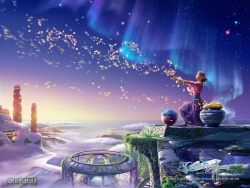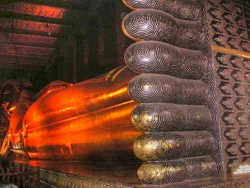Buddhism, Cosmology & Evolution
by John Stanley & David Loy
A face-on image from the Hubble space telescope, of a spiral galaxy powered by a black hole at its core. The thick ring around the yellow core is an area of active star-birth. Tightly wound spiral arms are faintly visible.
Even with all these profound scientific theories of the origin of the universe, I am left with serious questions: What existed before the big bang? Where did the big bang come from? What caused it? Why has our planet evolved to support life? What is the relationship between the cosmos and the beings that have evolved within it? Scientists may dismiss these questions as nonsensical, or they may acknowledge their importance but deny that they belong to the domain of scientific inquiry. However, both these approaches will have the consequence of acknowledging definite limits to our scientific knowledge of the origin of our cosmos. I am not subject to the professional or ideological constraints of a radically materialistic worldview. - The Dalai Lama
There is grandeur in this view of life, with its several powers, having been originally breathed into a few forms or into one; and that, whilst this planet has gone cycling on according to the fixed law of gravity, from so simple a beginning endless forms most beautiful and most wonderful have been, and are being, evolved. - Charles Darwin
For traditional Buddhist cosmology, the life cycle of a universe is cyclical. There is a period of its formation, a period where it endures, a period where it disintegrates and a period of void before a new universe forms from the luminous space that remains. That space, according to the Kalachakra Tantra (Wheel of Time) is inseparable from beginningless, universal consciousness.
The constraints of scientific materialism
A very different perspective is offered by mechanistic science. From its European origins in the seventeenth century to its final triumph in the nineteenth, it has insisted that matter is non-conscious stuff interacting in dead space. And these premises are not merely intellectual abstractions. They have become beliefs about reality, shared by a globalizing human culture. The structure of our subjective experience is inevitably influenced by the notion that we too are mechanisms, located in a non-conscious mechanical universe.
Such presuppositions have presented no obstacle to spectacular progress in science, instrumentation and technology. They are rarely questioned within the belief systems most common in science or society. We might know that quantum physics has revealed solid matter to be forms of energy and process, but we prefer not to consider the implications of the fact that, with such discoveries, materialism is transcending itself.
From zero-point field to the world-wide web Quantum electrodynamics is a powerfully predictive theory developed by Nobel prize-winning physicist Richard Feynman and others. It proposes that virtual particles, electrons and photons appear and disappear from a zero-point field, the quantum vacuum that pervades the universe. This is eerily similar to how Buddhist cosmology describes the nature of the cosmos, originating within a luminous space that is the ground of consciousness itself.
An economics-driven culture like ours prefers to compartmentalize such discoveries, rather than reflect upon and perhaps be changed by them. It eagerly embraces every technological application of quantum physics—from semi-conductors, lasers and fibre optics to computers to the internet. It bows to their trillion dollar economic impacts. The message is clear: forget the cosmology—it’s the economy, stupid!
An evolving universe But can we really forget the cosmology, without losing the plot for our own species? We first beheld the grandeur of the evolutionary process with Charles Darwin’s findings about the origin of life on Earth. And what is true for the origin of species on our planet no doubt reflects a universal principle: we live in an evolving universe, not an inanimate machine.
As Thomas Berry pointed out, if we restore the fundamental unity of spirit and matter, artificially split apart by scientific materialism, the scientific story of the universe can also serve beautifully as our new sacred story. For Buddhist cosmology, biological evolution presents no problem at all: natural history and spiritual history are two sides of the same coin. The beginning-less consciousness of luminous space gave rise to this evolving universe and from so simple a beginning endless forms most beautiful and most wonderful have been, and are being, evolved. But it is not inevitable that those endless forms will continue to evolve in a natural way.
The biggest news for 65 million years The self-creation of the Earth over time has continued for 4.5 billion years. Biological life emerged as single-celled organisms about 3.8 billion years ago. Multicellular life forms are 1 billion years old. Our “anatomically modern” human species is a mere quarter of a million years old. As Wes Nisker writes in his Evolution Sutra, we are just the new animal on the block.
Those lineages of life forms have co-evolved through extraordinary challenges of extinction and adaptation. “Mass extinction events” took place 440, 360, 245 and 208 million years ago. The fifth took place 65 million years ago, when a giant meteorite hit the Yucatan peninsula. The dinosaurs vanished, ending the era of giant reptiles and beginning the era of mammals like ourselves—the Cenozoic.
Biologists and earth scientists agree that in the twentieth century a sixth mass extinction began, and the only one to be caused by a particular species: us. Coral reefs are likely to be the first entire ecosystem to be eliminated from the Earth by human activity. A quarter of plant and animal species may vanish by 2050, an evolutionary crisis that is related to global climate breakdown but usually overshadowed by it. In essence, our present economic model is pushing all life on Earth towards tipping points for both biodiversity and the climate system.
This is quite possibly the biggest news for 65 million years, but it barely makes the mainstream news at all, because it raises taboo questions for the industrial growth society that we have come to take for granted. We’d rather not think about the implications for our way of living today, and the consumerism purveyed by advertising and corporate propaganda encourages us not to bother. It’s a lot more reassuring to keep up with the sport! But the disquieting questions remain. Why are we risking general evolutionary collapse? Aren’t we here to survive and thrive? Why has our planet evolved to support life anyway?


